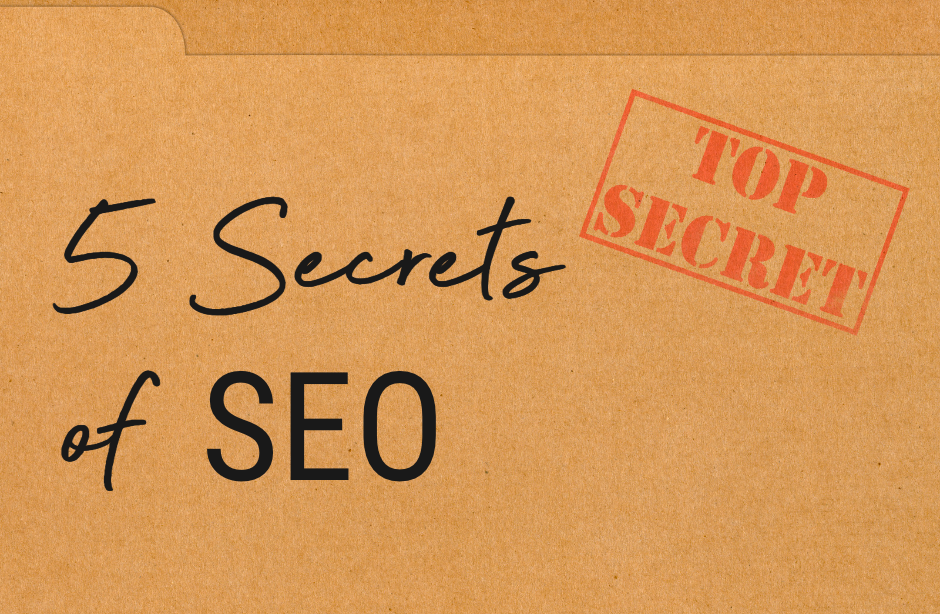How tempted are you to throw in the towel with your SEO strategy and jump straight to pay-per-click (PPC) advertising? While PPC might seem like an easy way to draw potential new customers to your website, it’s a short-term digital marketing strategy at best.
Not to mention, you’ll feel like you’ve wasted a bunch of money you could’ve spent elsewhere because once you stop paying for ads, your PPC traffic will stop as well.
So instead, invest in a long-term SEO strategy that will actually drive organic traffic to your website and boost your search engine rankings. Once you invest in SEO, you’ll see results long after your initial investment, making SEO far more cost-effective than PPC in many cases.
By following these five search engine optimization (SEO) secrets, you can ensure your strategy produces stellar results for your business!
What Are the Top 5 SEO Strategies?

The Internet is full of SEO strategies for businesses to get their websites to land on Google’s first search engine results page (SERP). From carefully tracking Google Analytics to going all-in on content marketing, dozens of SEO tools and techniques exist.
Yet, they won’t all benefit your SEO strategy. Here we’ve narrowed down the top five SEO tips that will genuinely enhance your SEO plan. They include:
- Keyword research and search intent
- Backlinks
- Crawling
- Presentation
- Ranking for multiple keywords through keyword clustering
1. Keywords Are Key
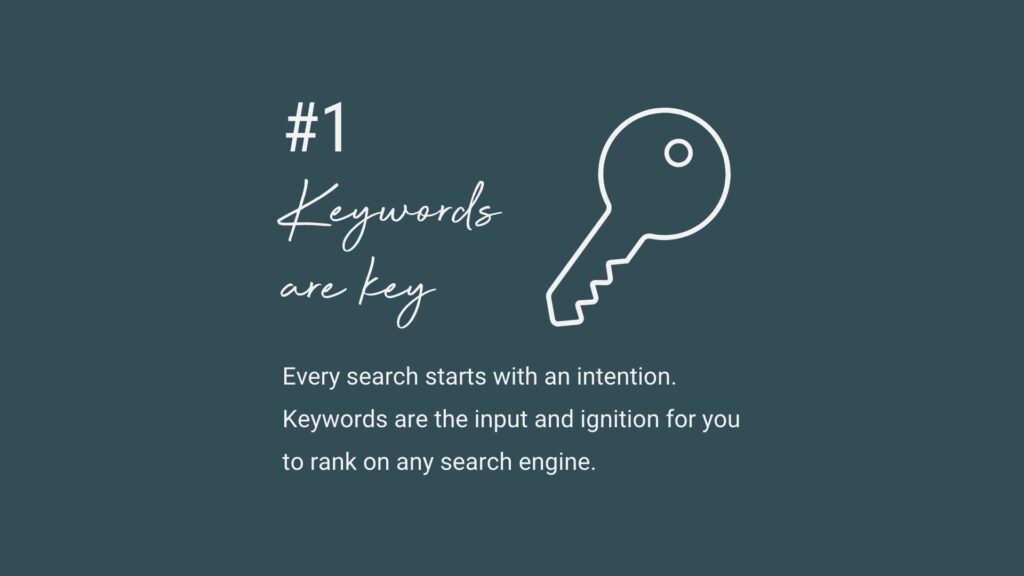
Keyword research is vital to rank on the first page of Google searches. It’s the start of every solid SEO strategy. Yet, how do you know which keywords are best to target for each specific webpage?
Sometimes, you may use head term keywords (more general terms) to target those looking for information in the beginning phase of the sales funnel. These people may or may not convert to paying customers. In contrast, at other times, you may use long-tail keywords to target a specific audience further down the sales funnel. These people have already done their research and are closer to making a purchase.
Regardless of your primary keyword, for on-page SEO, you want the keyword to be in the following locations:
- Meta title (title tag)
- Meta description
- URL
- H1
- Subheadings
- Internal links with optimized anchor texts
However, more importantly than keywords, you must also focus on search intent or why users type their query into the search engine.
Search engines want to provide relevant results for users, so they need to understand the reason for the search query. Creating content with the wrong intent could cause the piece of content not to rank at all.
For instance, if you have an eCommerce store selling pet food, you may not want to rank a product page for your all-natural, organic cat food with the keyword “best organic cat food.” The search intent with this keyword is to research different brands that sell high-quality, organic cat food. The intent is not to buy a specific product.
There are four types of search intent, which are:
- Commercial: doing research before making a purchase decision
- Informational: learning more about something
- Navigational: looking for a specific page
- Transactional: want to complete a particular action, like making a purchase
In the case of the cat food example, using a keyword with transactional intent, like “buy organic cat food,” could be better.
2. Backlinks Are the Backbone
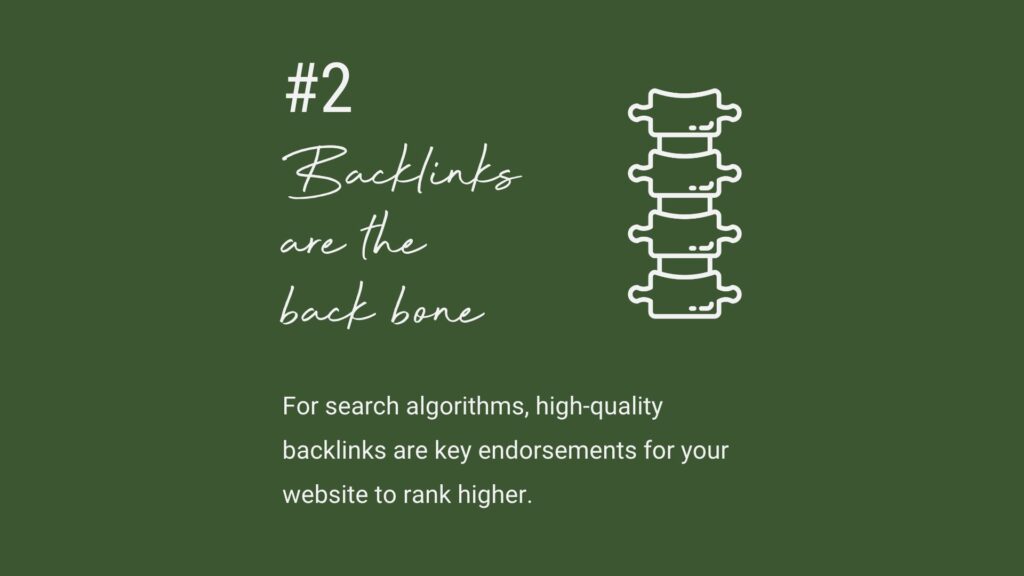
Link building is not obsolete and still plays a critical role in helping your website’s ranking and driving more traffic. It is, arguably, the best off-page SEO tactic you can use.
Think of high-quality backlinks as verified endorsements for your website. With them, your search engine ranking gets higher. Plus, you can get nice referral traffic from backlinks and even conversions!
3. Crawl Before Ranking
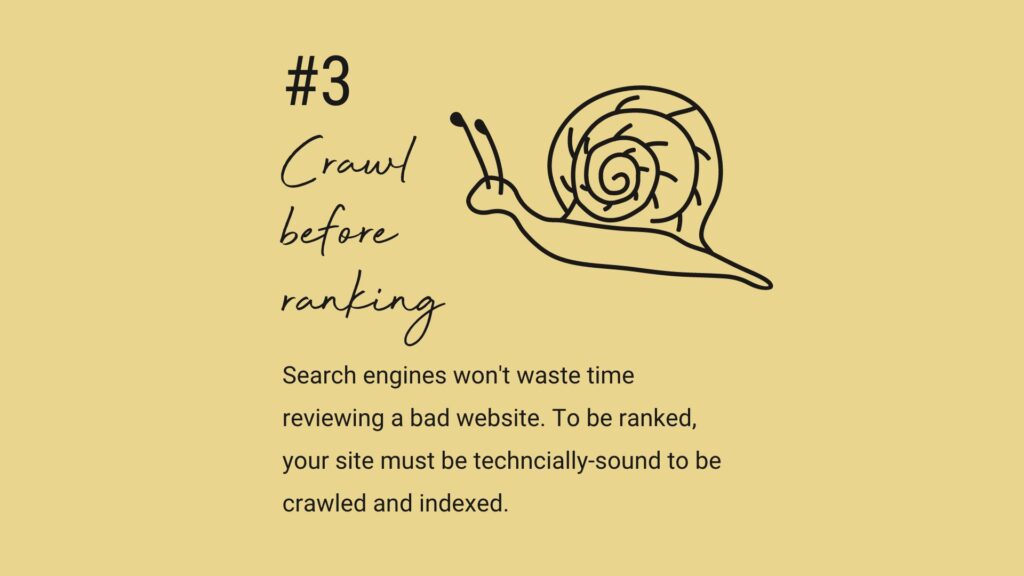
You can have an amazing SEO strategy, but don’t forget about technical SEO. If search engines can’t crawl your website properly, indexing becomes an issue. When search engines can’t index the content on your website site, no one will ever find it via a search engine.
Thus, when your website is easily crawlable, it doesn’t block search engines from crawling, nor does it block pages from being indexed.
Think of it like this: Easily crawlable website = doesn’t block search engines from crawling, doesn’t block pages from being indexed
To ensure the search engines can properly crawl your website, make sure you are not blocking search engines from crawling or indexing the site via meta robots tags, robots.txt files, and X robots tags.
Also, make sure all the pages that you want indexed are included in the site’s XML sitemap and that it has been submitted to Google Search Console and Bing Webmaster Tools.
Keep in mind search engines likely may not index pages for a keyword that already has tons of results. They also may not index poor-quality pages. So if you are having trouble getting your content indexed, look into these issues.
4. Presentation Does Matter
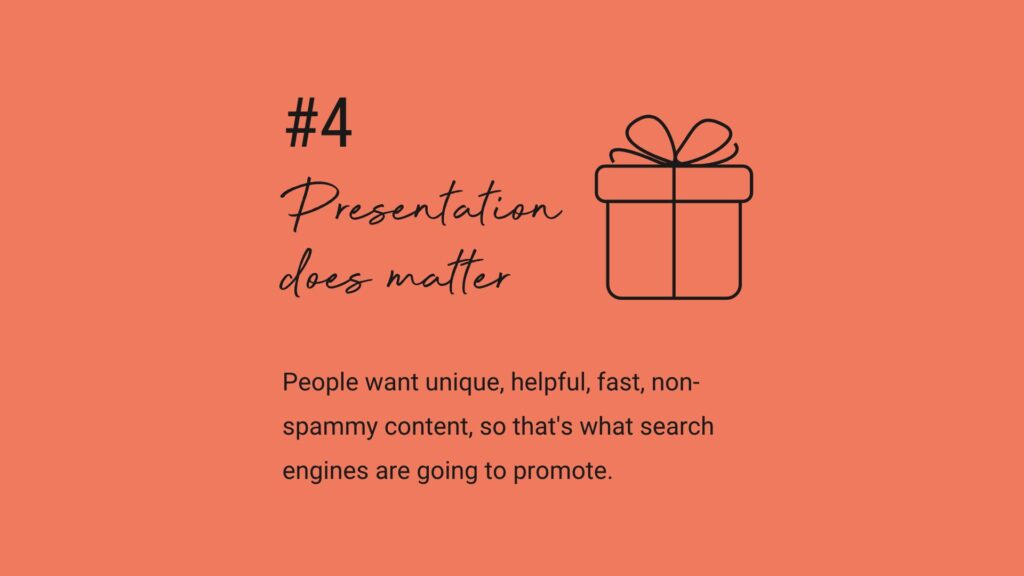
No one enjoys spammy content, especially not your target audience. It completely ruins the user experience and drives customers away.
Regardless of the type of content you create, it must be helpful and unique. You don’t have to become a WordPress wizard or use a dozen plugins to have an appealing and functional website. You don’t even need to understand HTML!
What you do need to do is craft high-quality content that entices viewers rather than turns them off.
Poor quality content isn’t just sore on the eyes. It could also lead your website to have a high bounce rate, the percentage of people who land on your website, then leave.
What qualifies as poor-quality content? It’s content that:
- Has too many ads on the page
- Lacks a table of contents
- Doesn’t have a logical outline structure
- Is missing keywords, attractive images, or illustrations
While Google has not confirmed that bounce rate is a ranking factor, many experts feel that it is a factor.
5. One Page, One Thousand Opportunities
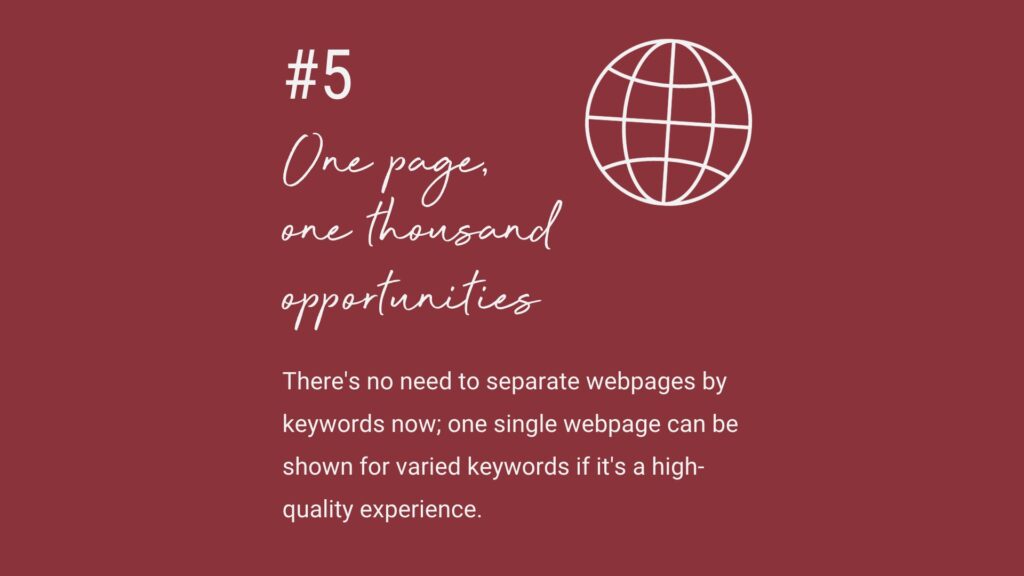
Gone are the days when each webpage could only rank for one keyword. Now, a single webpage can rank for several keywords when you create high-quality, intentional content.
This is possible due to keyword clustering, which is basically grouping similar keywords based on how Google groups them in the search results. By researching keyword clusters, you can see just how easy it is for one page to rank for multiple keywords simultaneously.
For example, the primary keyword “queen mattress” may also target similar keywords on the same page, such as:
- Mattress queen size
- Queen mattresses
- Queen size mattress
Unconfirmed SEO Rumors
You’ll come across plenty of other search engine optimization secrets that many say are the magic trick to getting your web pages to rank. While the jury is still out on these rumors, we explore whether they could impact your SEO.
Clicks on GBP Driving Directions May Help GBP Rankings
Google Maps may use driving directions and popularity signals, such as how often users look up directions for a business location they can visit in person, as ranking factors.
While it’s possible Google solely uses driving directions as a ranking factor, the algorithm could also use driving directions with reviews to rank local search results.
Even though we can’t be sure how Google uses information from Maps in its rankings, it’s best if you embed the correct Google Business Profile listing on your website.
Google Reads the Whole Page Title Even if It Gets Cut Off
Many SEO experts will tell you to keep webpage titles under 65 characters because, beyond this, search engines will cut off the end of the page title, and users won’t be able to read the whole thing.
But the big question remains: can cut-off words in page titles help the page rank even though you can’t see them?
One expert, Joel Headley, performed a test to find out. He added random letters to the end of page titles to make them, on average, nearly 200 characters long.
The results?
The added letters triggered the pages to show up in search results! Despite users not seeing these words, search engines can still read them.
Thus, the lesson here is that you shouldn’t be afraid to write longer page titles when necessary. Longer page titles will still help the page rank even when search engines don’t show the full page title in search results.
Social Media Activity May Impact Rankings
Google has stated that sharing links to social media content doesn’t affect rankings. Yet, evidence suggests otherwise.
Referral traffic from social media platforms like Facebook, Instagram, and LinkedIn, in addition to activity on social media posts that link to your website, may impact SEO.
However, even though some may see an indirect increase in organic traffic from sharing website links on social media, Google has not confirmed this is a ranking factor.
Like social media, podcasts are also becoming a helpful SEO asset to help businesses gain visibility and rank higher via backlinks and referral traffic.
But again, this is not a confirmed ranking factor.
What’s the Secret to Ranking High in SEO?
Ultimately, the secret to ranking high on organic search results is a holistic approach where you address the five SEO secrets discussed above. With proper implementation, your SEO strategy will produce results when you focus on the following:
- Keyword research and search intent
- Link building
- Producing high-quality content
- Technical SEO
- Using keyword clusters
What Are the Secrets of SEO in 2023?
Digital marketing and SEO are constantly evolving, so strategies must also change.
According to these digital marketing trends of 2023, it’s best to implement the following into your SEO strategy:
- Artificial intelligence, or AI, such as:
- Chatbots for conversational marketing
- Email automation
- Website personalization
- Increased intelligence level of SERPs
- Real-time analytics and metrics tracking
- Mobile-friendliness for a better customer experience
- Using structured data
- Think of the user experience and user intent
What Does a Successful SEO Strategy Look Like?
There’s no one-size-fits-all successful SEO strategy for businesses.
In fact, I, Eric Ritter, have dozens of examples of successful strategies I’ve implemented for various clients.
One client, a personal injury law firm in Tampa, FL, gained over $100,000 of organic SEO traffic per month! Another client in the docking industry saw a 658% increase in organic traffic!
The results from my strategies are beyond outstanding and prove that when you take the SEO secrets discussed into account, your business can seriously benefit. If you want to know more about my successful SEO strategies, explore these case studies.
The Search Engine Sommelier

Don’t get bogged down by all the information floating around about SEO. Simply follow the five SEO secrets discussed here, and your business will start to see improvements.
For assistance building your business’s SEO strategy, contact me. Let’s chat about your goals, budget, and ideas to see how I can help make your business thrive!
